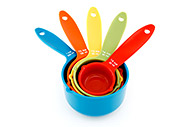
Marketers of fad diets know how to target your weaknesses and play on your desire to lose weight, but remember that these diets are not the answer to achieving long-term health and weight loss. In fact, they can be downright dangerous. When you feel the lure of a fad diet, keep yourself on the right track by remembering these key points:
A new fad diet is like an addiction.
For chronic dieters, starting a new diet provides a euphoric high that encompasses the hopes, motivation, and drive to get your life back on track and lose weight for good. When the program fails, dieters look for hope and will often find promise in the next diet. Thus, the downward spiral of diet addiction continues.
False hope and likely failure.
Many diet claims are so convincing that your sense of reason is blinded by the false hope that it is the magic bullet you need. When you find that you can barely function on cabbage soup or by completely cutting out a food group, the first thought is that you failed. You blame yourself, and your self-esteem plummets — often leading to emotional eating.
Quick fixes become the only answer.
Losing more than a couple of pounds a week can be unhealthy. Slow and steady is the best approach. Weight loss is never completely effortless; planning healthy meals, grocery shopping, exercising, and focusing on internal cues takes time. However, the most effective and healthy path to long-term weight loss is through lifestyle changes, not quick fixes.
Harmful to your emotional and physical health.
The process of cycling through diets eventually leads to decreased metabolism, weight gain, frustration, negative body image, cravings and binges, and distrust in your innate ability to monitor food intake. These consequences increase the likelihood of developing an eating disorder.
You lose sight of hunger cues.
Contrary to what the claims may say, most fad diets are too low in calories, and you will be hungry. Ultimately, you will have to return to regular eating. Chances are you will overcompensate with extra calories to satisfy feelings of intense hunger combined with the stress of feeling like you failed. When you are stuck in a pattern of ignoring hunger pains followed by binge eating, you eventually lose your ability to recognize true hunger signals.



 8 Ways to Overcome a Lack of Support for Weight Loss
8 Ways to Overcome a Lack of Support for Weight Loss
 6 Tips for Controlling Portions
6 Tips for Controlling Portions
 Some People Dream of Success
Some People Dream of Success
 5 Breakfasts Under 300 Calories
5 Breakfasts Under 300 Calories
 4 Things to Know About Negative Calorie Diets
4 Things to Know About Negative Calorie Diets
 Healthy Ways to Motivate Your Friends
Healthy Ways to Motivate Your Friends
 15 Bites and Nibbles That Keep You From Losing Weight
15 Bites and Nibbles That Keep You From Losing Weight
 Recover from Weight Loss Setbacks
Recover from Weight Loss Setbacks

 Pinterest
Pinterest RSS Feed
RSS Feed